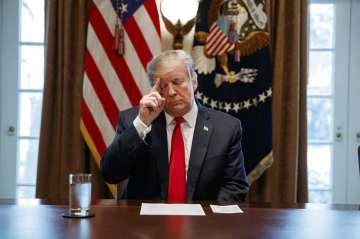US heading towards National Emergency: It's not what you think | All you need to know
There is hardly anything to worry for Indians living in the US, or planning to travel or have loved ones there (apart from polar vortex), because the national emergency in the US is not the same as India.

US President Donald Trump has told White House reporters that he is very likely to declare national emergency to secure funding for wall on the US-Mexico border.
"I have the absolute right to declare a national emergency. I haven't done it yet. I may do it. If this doesn't work out, probably I will do it. I would almost say definitely," Trump told reporters on Thursday.
But there is hardly anything to worry for Indians living in the US, or planning to travel or have loved ones there (apart from polar vortex), because the national emergency in the US is not the same as India.
The National Emergencies Act of 1974 empowers the president to activate special powers during a crisis. The US Congress can undo a state of emergency declaration, but it would likely require a veto-proof majority, which is unlikely to come from the Republican-controlled Senate.
A national emergency in the US is essentially a way for the executive to bypass Congress to implement a decision. In this case, Trump seeks to bypass Congress to secure funding for the wall. Emergency, as we know if India, shall not be applicable and shall not disrupt any other aspects of life in the country.
In fact, the United States is currently under 31 concurrent states of emergency and, if Trump goes ahead with his plan, it would be 32nd simultaneous emergency in the US. Even Trump has already three national emergencies during his tenure, most prominently a national emergency meant to punish foreign actors who interfere in American elections, though the move garnered bipartisan criticism for not going far enough. He's also invoked emergency powers to slap sanctions on human rights abusers around the globe and on members of the Nicaraguan government amid corruption and violent protests there.
Here's a full list of the 31 active national emergencies, dating back to 1979:
1. Blocking Iranian Government Property (Nov. 14, 1979)
2. Proliferation of Weapons of Mass Destruction (Nov. 14, 1994)
3. Prohibiting Transactions with Terrorists Who Threaten to Disrupt the Middle East Peace Process (January 23, 1995)
4. Prohibiting Certain Transactions with Respect to the Development of Iranian Petroleum Resources (March 15, 1995)
5. Blocking Assets and Prohibiting Transactions with Significant Narcotics Traffickers (October 21, 1995)
6. Regulations of the Anchorage and Movement of Vessels with Respect to Cuba (March 1, 1996)
7. Blocking Sudanese Government Property and Prohibiting Transactions with Sudan (November 3, 1997)
8. Blocking Property of Persons Who Threaten International Stabilization Efforts in the Western Balkans (June 26, 2001)
9. Continuation of Export Control Regulations (August 17, 2001)
10. Declaration of National Emergency by Reason of Certain Terrorist Attacks (September 14, 2001)
11. Blocking Property and Prohibiting Transactions with Persons who Commit, Threaten to Commit, or Support Terrorism (September 23, 2001)
12. Blocking Property of Persons Undermining Democratic Processes or Institutions in Zimbabwe (March 6, 2003)
13. Protecting the Development Fund for Iraq and Certain Other Property in Which Iraq has an Interest (May 22, 2003)
14. Blocking Property of Certain Persons and Prohibiting the Export of Certain Goods to Syria (May 11, 2004)
15. Blocking Property of Certain Persons Undermining Democratic Processes or Institutions in Belarus (June 16, 2006)
16. Blocking Property of Certain Persons Contributing to the Conflict in the Democratic Republic of the Congo (October 27, 2006)
17. Blocking Property of Persons Undermining the Sovereignty of Lebanon or Its Democratic Processes and Institutions (August 1, 2007)
18. Continuing Certain Restrictions with Respect to North Korea and North Korean Nationals (June 26, 2008)
19. Blocking Property of Certain Persons Contributing to the Conflict in Somalia (April 12, 2010)
20. Blocking Property and Prohibiting Certain Transactions Related to Libya (February 25, 2011)
21. Blocking Property of Transnational Criminal Organizations (July 25, 2011)
22. Blocking Property of Persons Threatening the Peace, Security, or Stability of Yemen (May 16, 2012)
23. Blocking Property of Certain Persons Contributing to the Situation in Ukraine (March 6, 2014)
24. Blocking Property of Certain Persons With Respect to South Sudan (April 3, 2014)
25. Blocking Property of Certain Persons Contributing to the Conflict in the Central African Republic (May 12, 2014)
26. Blocking Property and Suspending Entry of Certain Persons Contributing to the Situation in Venezuela (March 9, 2015)
27. Blocking the Property of Certain Persons Engaging in Significant Malicious Cyber-Enabled Activities (April 1, 2015)
28. Blocking Property of Certain Persons Contributing to the Situation in Burundi (November 23, 2015)
29. Blocking the Property of Persons Involved in Serious Human Rights Abuse or Corruption (December 20, 2017)
30. Imposing Certain Sanctions in the Event of Foreign Interference in a United States Election (September 12, 2018)
31. Blocking Property of Certain Persons Contributing to the Situation in Nicaragua (November 27, 2018)